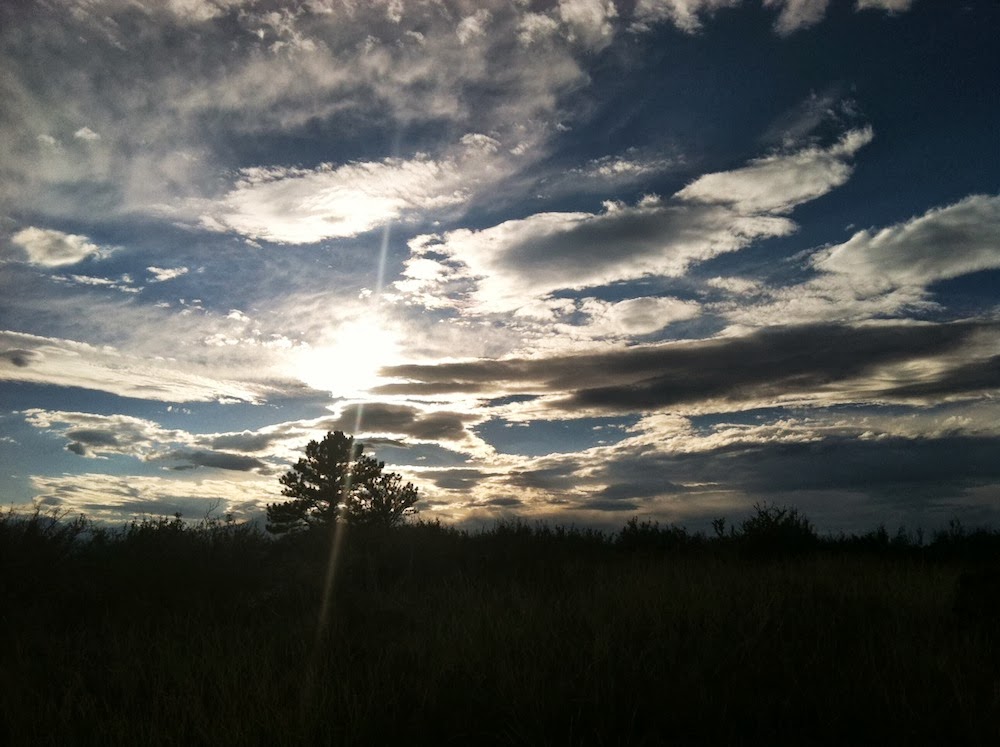 |
| Late-day sun from Rabbit Mountain, Lyons, CO |
A common question asked of ultra runners is “Why do you run so far and for so long?” It’s a perfectly reasonable question from those outside the ultra running world, since ultramarathons can easily come across as a most unreasonable proposition.
My particular preference as an ultra runner is for long trails through the mountains, as opposed to, say, logging an obscene number of quarter-mile laps at the local high school track simply for the sake of accumulating distance. I could wax poetic about how my trail/mountain ultra running fosters a deep connection to landscape, about how continuous movement through and across terrain for hours on end induces a kind of zen-like focus and peace of mind, about how immersing myself in deep wilderness grounds my soul and balances the business of day-to-day life, and about how the gratifying evolution of pushing my body and mind through ever-longer and harder runs continually redefines perceptions of my own boundaries and limitations.
But I’m not going to do that (even though I sort of just did). The answers to why we run so far and for so long will be as varied and personalized as the ultra running community itself. Each person could give you a unique answer.
If there exists a global truth, though, I believe it is this: no matter what the personal reason, the drive and motivation must come from within. External sources of motivation are fleeting and comparatively weak. The glory of actually winning a race is temporary and reserved for an elite few. The narcissistic training updates posted to social media statuses (I’m plenty guilty of this) offer a stroke to the ego but little more. Motivations such as these are insufficient to sustain a commitment to ultra running.
At the end of the day, you are left with a choice: to run far or not. It is not an easy or simple commitment to make. The miles are long and the training is hard. Almost by necessity it can be profoundly time consuming. It inevitably involves battles between health and injury. And above all else it requires sacrifice … the sacrifice of time and energy that could otherwise be spent in myriad productive ways (sleeping, relaxing, reading a book, spending QT with loved ones).
If you’re not doing it for reasons that come from within, ultimately you’ll decide the sacrifice isn’t worth it and you move on to less-demanding endeavors.
But if you do have that internal drive and motivation, and you do decide the sacrifice is worth it, then external motivations can help it become something greater than itself. Like this year’s Gluten-Free Ultramarathon Challenge in partnership with the National Foundation for Celiac Awareness to fundraise to establish new scholarships for gluten-free student-athletes. In this way, the ultra running and the racing become a vehicle that transcends the personal and tries to positively impact the community.
The important litmus test, though, is this: If you took away the fundraising, and the scholarships, and the NFCA, and the blog posts about training and race reports, would I still do it? That answer is unequivocally yes. My motivation and drive comes from within, even as external motivations help the ultra running try and bridge from the personal to the public in ways that benefit the community.
The gluten-free recipes we share on this blog follow a similar, parallel trajectory. Blogging and the social media engagement that comes along with it can easily become a constant search for external validation. The obsession with building readership, pageviews, and subscriber numbers. Chasing ever-increasing follower counts on Facebook and Twitter. Seeing one’s name and blog and recipes in articles and roundups and “best of” lists. It can be a constant grind, lest you slip out of the spotlight or see your numbers plateau or (eek!) decline.
But again, if you strip that all away—if all that remains is you, your family and friends, and the food in your kitchen—would you still do it? For us, that answer has always been yes. It is about feeding our family healthy, diverse, delicious gluten-free meals. Only when we do that can we take the next step and turn outward with sharing recipes. Sometimes you must do something for yourself before you can do it for others.
Blogging can be that way. Many bloggers will tell you (rightly) that blogging is hard. Much like ultra running, it takes long-term commitment and dedication, and it often involves sacrifice—both money spent on ingredients to develop and test new recipes and especially time each week that could be spent in other ways but that we choose to spend in this way in particular.
And then enters the beautiful bridge that spans the personal and the public. Once you do turn outward, you can build on the personal motivation and attach an external motivation that makes what you do something much greater than it was before. For us, that motivation is knowing that we are helping people in the gluten-free community, as evidenced by the emails from readers that describe how one of our recipes has given them a food they never thought they’d eat again, or the parent searching for ways to feed a newly diagnosed child.
With my biggest race ever just eight days away, and with continuing to try and keep the blog posts flowing as we jet off to Europe for a few weeks, I’m reminded that often the best things in life arise from motivations that are both personal and public. Either can prompt things that are great, but together, they often help to build something even greater.
–Pete